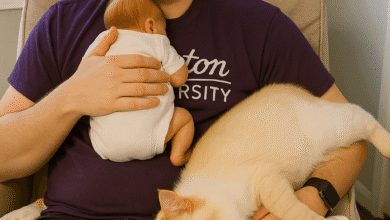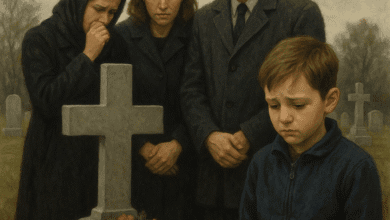My Wife Left Me with Our Children When I Lost My Job.

Two Years Later, I Found Her Crying — And Everything Changed
Two years ago, my life turned upside down.
I lost my job as a software engineer at a promising startup. The company went bankrupt overnight, and with it, I lost our stability, health insurance, and the comfortable future we had dreamed of. It was the beginning of a nightmare.
My wife, Anna, couldn’t handle the pressure.
One morning, after a cold, silent argument, she packed a suitcase, glanced at me — as I held our four-year-old twins in my arms — and said:
“I can’t take this anymore.”
She walked out without looking back.
There I was, alone with Max and Lily, two children who couldn’t understand why their mother wasn’t coming home. I spent months trying to explain her absence in words that could comfort their hearts — and mine.
The first year was brutal. I drove for ride-share apps at night and delivered food during the day. I lived off coffee and broken hopes. My elderly parents helped however they could, but the fight was mine alone.
Max and Lily were my light. Every “I love you, Daddy” kept me breathing.
The second year brought a turning point. I landed a freelance coding project, and the client was so impressed with my skills that they offered me a full-time remote position at a cybersecurity firm.
The salary wasn’t six figures, but it was stable. We moved into a smaller, cozier apartment. I started taking care of myself again, returned to the gym, cooked real meals, and established a routine for the kids. For the first time in a long while, we were doing okay.
And then it happened.
On a random afternoon, between coffee and another online meeting, I walked into a café near home. I sat down, opened my laptop, and got to work. The smell of freshly brewed coffee and the soft murmur of voices made the place feel comforting.
Until I saw her.
Anna sat alone at a table in the back, eyes red and tears streaming down her face.
She was no longer the confident, impeccable woman I remembered. She wore a worn-out coat, her hair was messy, and the sadness on her face spoke volumes.
For a second, my instinct was to ignore her. After all, she left us.
But my heart spoke louder — she was still the mother of my children.
She saw me too. Our eyes met. Hers filled with shame. Mine, with confusion.
I got up, walked over to her table, and sat down without asking.
“Anna… are you okay?” I asked softly.
She hesitated, then began to cry.
“David… I’ve lost everything. The job, the support of my family… I regret leaving you. I thought I was choosing a better life, but I only found loneliness.”
I sat in silence. Part of me wanted to scream. Another part wanted to understand.
She went on: “Did you take care of the kids? Are they okay?”
“They are,” I replied. “They missed you. Every single day.”
We talked for hours. I listened to her regrets, her pain, her mistakes. I didn’t know if I could ever fully forgive her, but that day, in that café, I realized that maybe time had done to her what it did to me — taught us both to value what truly matters.
We didn’t get back together.
But, slowly, we rebuilt respect. For me. For the kids. For the story we once shared.
Because sometimes, reunions aren’t meant to reignite love — but to bring closure with dignity.
💰 Financial Loans: A Relief That Requires Responsibility
In addition to personal loans, there are other types of credit such as payroll loans, early withdrawal of FGTS funds, and refinancing of vehicles or property. All these options share one thing in common: they compromise your future income.
It’s important to remember that a loan is a debt with a deadline and interest. During times of crisis, the monthly payment can become unaffordable, leading to missed payments, a bad credit score, and even legal actions.
To avoid these risks:
- Never take out a loan without planning.
- Build an emergency fund to avoid relying on credit in times of urgency.
- Use credit as an ally, not as an escape from reality.
- Have a clear plan to repay the debt before signing any contract.





